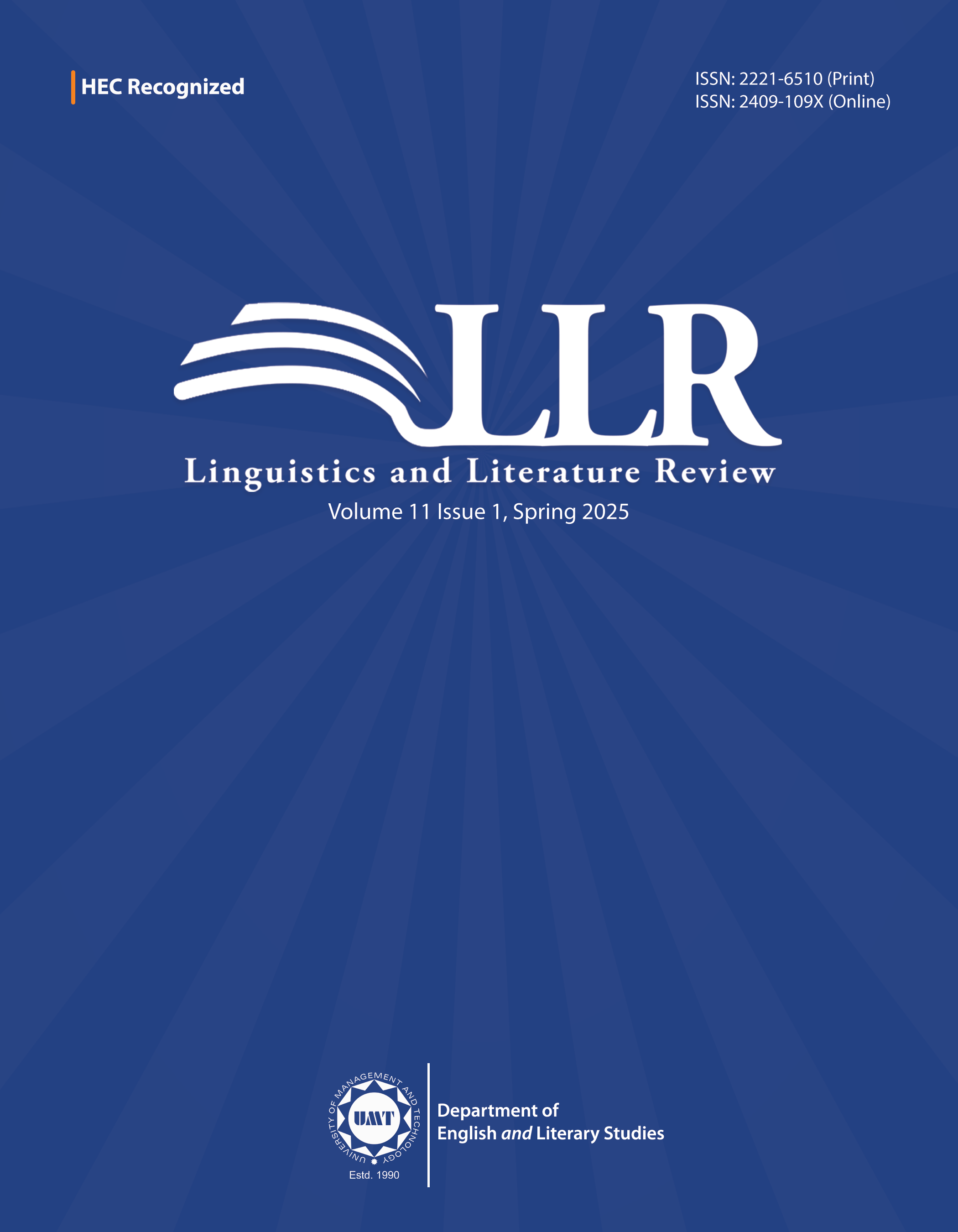Voices of Defiance: Unveiling Dalit Consciousness in Meena Kandasamy’s Selected Poems
Abstract
 Abstract Views: 0
Abstract Views: 0
The paper aims to examine the caste-based racism rooted in Hindu society that perpetuates Dalit agony while also exploring the emergence of resistance through a critical analysis of Meena Kandasamy’s selected poems. The poems are taken from Kandasamy’s poetry collection Touch,and include ‘Another Paradise Lost’, ‘Shame’, ‘Liquid Tragedy’, ‘Prayers’, ‘We Will Rebuild the Worlds’, and ‘Dignity’. Kandasamy’s poetry criticizes how doctrines of Hinduism, specifically the notion of Karma, have traditionally rationalized the caste system by marginalizing individuals and depriving them of basic human rights. Using the qualitative research approach, the paper employs textual and contextual analysis to examine how Kandasamy’s poetry depicts the terrible realities faced by the Dalit community, exposing how oppressive institutions are rooted and sustained through religious and cultural customs. The poems under analysis portray the various sufferings of Dalit individuals, mainly focused on women, which are backed by the religious doctrine of Karma. Furthermore, these poems document the emergence of a collective resilience, particularly among Dalit women, who emerge as key actors in the struggle against casteism. The study aims to understand how Kandasamy portrays the fury and resistance of Dalits, reflecting a shift from painful suffering to active rejection of the discriminatory beliefs of religion and tradition. Through the idea of Dalit consciousness, the paper seeks to examine the evolution of Dalit identity, focusing on how literature can serve as both an expression of resistance, rejection of unjustifiable doctrines, and a demand to the disintegration of established societal hierarchies.
Downloads
References
Ambedkar, B. R. (1989). Annihilation of caste. In Dr. Babasaheb Ambedkar writings and speeches (pp. 47–51). Government of Maharashtra.
Arora, P. (2020). Analyzing the use of language in Meena Kandasamy's The Gypsy Goddess. Research Journal of English, 5(2), 354–362.
Fanon, F. (1963). The wretched of the earth. Grove Press.
Foucault, M. (1976). The history of sexuality volume 1: An introduction. Pantheon Books.
Guru, G. (2009). The caste system and its contemporary implications. Oxford University Press.
Gupta, A. (2022, June 12). She wrote a dystopian novel. Now her fiction is crossing into reality. The New York Times. https://www.nytimes.com/2022/04/27/books/vauhini-vara-the-immortal-king-rao.html
Gupta, D. (2000) Interrogating caste: Understanding hierarchy and difference in Indian society. Penguin Books India.
Hanchinamani, B. (2001). Human rights abuses of Dalits in India. Human Rights Brief, 8(2), 15–19
Hiwrale, A. (2020). Caste: Understanding the nuances from Ambedkar’s expositions. Journal of Social Inclusion Studies, 6(1), 78–96. https://doi.org/10.1177/2394481120944772
Iqbal, H. Z. (2024). Revisiting colonial encounters in Maitreyi Devi’s It Does Not Die: A Romance: A postcolonial perspective. SAGE Open, 14(2), 1–11. https://doi.org/10.1177/21582440241252405
Karthika, S. (2024). Voices of resistance: Caste and gender in Meena Kandasamy's poetry. Samyukta: A Journal of Gender and Culture, 9(1), 1–11. https://doi.org/10.53007/SJGC.2024.V9.I1.215
Kandasamy, M. (2006). Touch. Peacock Publications.
Mahto, M. L. (2015). Meena Kandasamy’s touch: An articulation of the voices of marginalized. Ars Artium: An International Peer Reviewed-cum-referenced Research Journal of Humanities and Social Sciences, 3, 11–17
Rathi, V. P. (2019, September). Savage treatment of untouchables in Meena Kandasamy’s “One Eyed” [Paper presentation]. The International Conference on Paradigms of Marginality in Literature - Exploring the Nuances, Madurai Kamaraj University, Madurai, India.
Sangeetha, J., Mohan, S., Hariharasudan, A., & Kannan, R. (2022). An analysis of linguistic discourses and literary techniques in Meena Kandasamy’s selected works. Theory and Practice in Language Studies, 12(2), 342–347. https://doi.org/10.17507/tpls.1202.16
Sarangi, J. (2011, January 1). Jaydeep Sarangi reviews Touch by Meena Kandasamy. Mascara Literary Review. https://www.mascarareview.com/jaydeep-sarangi-reviews-touch-by-meena-kandasamy/
Spivak, G. C. (1988). Can the subaltern speak? In C. Nelson & L. Grossberg (Eds.), Marxism and the interpretation of culture (pp. 271–313). University of Illinois Press.
Spivak G. C. (1990). The post-colonial critic: Interviews, strategies, dialogues. Routledge.
Spivak G. C. (1999). A critique of postcolonial reason: toward a history of vanishing present. Harvard University Press.
Soumya, K. M. (2021). Aesthetics of Dalit literature with special reference to Meena Kandasamy’s poetry. Palarch Journal of Archeology of Egypt, 18(10), 518–526.

This work is licensed under a Creative Commons Attribution 4.0 International License. Authors retain copyright and grant the journal right of first publication with the work simultaneously licensed under a Creative Commons Attribution (CC-BY) 4.0 License that allows others to share the work with an acknowledgment of the work’s authorship and initial publication in this journal.







